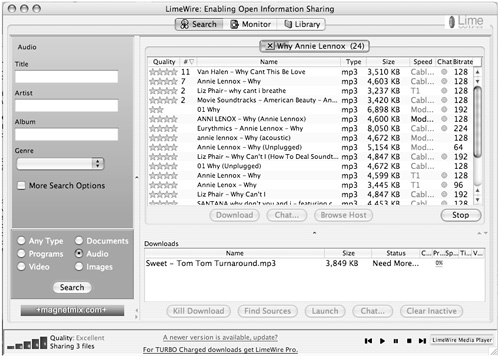Everyone knows the story of Napster by this point. College student Shawn Fanning (baby nickname: “the napster” because of his sleeping habits) threw together some rickety old Windows software to transmit the titles of any music tracks you had on your PC to a central database.
Other users could search that database looking for titles they wanted. When they found a match, the Napster software would set up a peer-to-peer connection and allow direct transfer of the music bits from your PC to the unknown fan elsewhere. Your incentive to share was that you in turn would be able to get files from other people similarly sharing their titles.
That was the concept at least. In practice, the record companies and some bands took exception to freelance distribution. By this time, Fanning had parlayed his idea and some prototype software into a start-up venture backed by premier venture capitalist company Kleiner Perkins Caulfield and Byers. At its peak, Napster claimed it had 70 million users, and even if they only exaggerated by the industry standard factor (ten-fold), that's still a lot of users.
Napster's demise took a couple of years to wind through the legal system, but the central point never seemed that subtle to me: you cannot legally broker the wholesale transfer of other people's intellectual property. Naturally, the record companies conducted themselves with their usual rapacious shortsightedness. Instead of licensing the Napster software to supply what customers clearly wanted, and charging fees, they tried to sue Napster out of existence. It's a reprise of 1992 when they killed DAT (Digital Audio Tape) by encumbering it with anticopying hardware backed by law. Incredible.
Which brings us to the current situation. Napster is just about completely dead. Apple has taken the largest slice of the online music market by offering the service that everyone wanted all along: reasonably priced legal music downloads through its iTunes Music Store. The music you buy on iTunes can easily be played on iPods, which are a high profit margin product for Apple. Microsoft is poised to leverage its monopoly and belatedly bundle its imitation of Apple's Music Store. And a number of underground, peer-to-peer file-sharing distributed databases have replaced Napster's centralized model, most notably a service called BitTorrent.
When I tried the Napster software in its heyday, all the way back in the last millennium, my first thought was, “Why on earth didn't they write this in Java?” It was a simple network database lookup with peer file transfer capability front-ended by a simple GUI. Tailor-made for Java! Fanning was not familiar with Java, so he churned out his Windows-only software. Though Napster has now passed on to that great big recording studio in the sky, others still carry the conductor's baton.
Bearshare, Gnutella, and LimeWire are currently three popular applications for sharing files (including .mp3 music files) across the net. They use the Gnutella client protocol, which is a search engine and file serving system in one. It is wholly distributed. Anyone can implement it to share their content (any files) with others. The great thing about LimeWire is that it is written in Java. You can download the application from www.limewire.com and see for yourself. The main screen is shown in Figure 2-5.
Since LimeWire is written in Java, the program runs on Windows, Macintosh, Linux, Solaris, IBM mainframes, and other computing platforms. The application has a solid, professional feel to it, and is fully functional. It has more than 3 million users, and is estimated to be present on 1.5% of all PCs.
LimeWire is now being sued by the record industry. Win or lose, the record industry will probably be able to drive LimeWire out of business. LimeWire has responded by going open source, so download a copy of the application while you can, and see how the experts write Java GUIs.
When someone asks me about Java client applications, LimeWire, in Figure 2-5, is one of the programs I like to show them.

